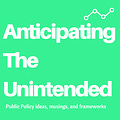This newsletter is really a public policy thought-letter. While excellent newsletters on specific themes within public policy already exist, this thought-letter is about frameworks, mental models, and key ideas that will hopefully help you think about any public policy problem in imaginative ways. It seeks to answer just one question: how do I think about a particular public policy problem/solution?
PS: If you enjoy listening instead of reading, we have this edition available as an audio narration on all podcasting platforms courtesy the good folks at Ad-Auris. If you have any feedback, please send it to us.
- RSJ
News reports suggest the vaccination drive among frontline workers is going slower than expected.
The issue isn’t the supply. It’s demand.
Frontline workers seem to have apprehensions about the safety of the vaccines.
An Old Story
I was reading up on the history of vaccines last week after I heard a good BBC history podcast on Edward Jenner who did pioneering work on smallpox vaccine. Four points stood out:
The scourge that was smallpox. It was super infectious, and the fatality rates were over 30 per cent. It wiped out civilizations as European powers spread it through South America and Africa. There was no real cure except something called variolation where a small amount of material from smallpox scabs were given directly to healthy people. These healthy people then developed symptoms of smallpox but these were milder. Fewer of them died through this than the normal method of getting the pox.
Jenner discovered vaccination somewhat serendipitously. He came across a milkmaid who told him she won’t get smallpox because she had already got cow pox (a milder disease). Jenner tested this theory by giving his gardener’s son a small dose of cow pox material. After a few months, he exposed the boy to the smallpox virus on multiple occasions. The boy never developed smallpox. Soon, Jenner wrote his treatise ‘On the Origin of the Vaccine Inoculation’. It wasn’t accepted by any reputed journal because it lacked adequate scientific rigour (even for those days). Jenner self-published the treatise.
The vaccination method became hugely popular. There was no state drive to spread it. People tried it out and it spread through word of mouth. So widespread was Jenner’s fame that when France jailed a few doctors from England on some specious charge of espionage, he wrote to Napoleon to free them. Napoleon agreed because it was Jenner.
The anti-vaxxer movement started right away. Since Jenner published his methodology for anyone to adopt, the doctors who earned their living through variolation and its side effects didn’t take to it. They did their bit by spreading misinformation. Also, injecting cow pox material meant other infections could get into a health person. This meant there were always cases of people contracting, or even dying, of other diseases after taking the vaccine. The vaccine scepticism took roots. And it hasn’t gone away since then.
Why The Scepticism?
This got me thinking on why is it difficult for people to believe in the effectiveness of vaccines? Or, on climate change? Or, why do good policy proposals often lack popular support?
Three reasons seem likely:
Our brains aren’t wired to believe non-intuitive concepts. These concepts aren’t often self-evident. Even if we understand them in theory, we end up doing the more intuitive wrong thing in practice. Behavioral economists have demonstrated this with multiple experiments. Vaccination is a non-intuitive concept. To inject oneself with a mild variant of a disease willingly in the hope that it will create long-term immunity goes against the intuitive idea of self-preservation. The notion of price in economics is similar for lay people. That price is a signal that adjusts itself to demand and supply instead of being centrally controlled is difficult to comprehend even if you are taught the theory. The first instance of surge pricing by Uber and the theory collapses. You believe it must be controlled. Pretty much the same way we react when people hear the news of deaths after vaccination.
People don’t get probabilities. That more people will likely die without a vaccine than because of an unproven side effect of taking the vaccine can be proven with data. But the notion that we invite the side effects because we take a vaccine on our own while contracting a disease is outside of our control is quite strong. This obfuscates our understanding of probability. Even during the current pandemic, the probabilities weren’t clearly thought through by the policymakers. The Covid-19 vaccine was clinically ready almost a year back when we had the virus genome mapped. From then on it was about doing a sound cost-benefit analysis of what level of vaccine testing is acceptable given the costs of loss of human lives and the impact of lockdown on the economy. We might have been ready to use a vaccine much earlier had we done this right. In any case, that the vaccine is ready within a year when compared to almost a decade it took earlier is proof that we have taken a right probabilistic call, albeit a bit late. This should have been the norm earlier.
News amplifies exceptions and this erodes the trust on experts. You will not hear of the millions who have taken the vaccines without any side effect. But every single death of someone who has taken a vaccine will be reported. That the cause of death is unrelated to the vaccine itself will struggle to find space in the news cycle. This is because we are looking for adverse news to confirm our intuitive bias about it. The more we come across this kind of news, the greater our scepticism of experts. Conspiracy theories take off from here.
The solution to this kind of scepticism about a sound public policy is available. Eugene Bardach in his seminal book A Practical Guide for Policy Analysis outlined the eightfold path to arriving at a policy decision. The eighth and the final step is ‘tell your story’ which is as important a step as any of the previous steps taken to arrive at the policy decision. This is often an area that’s given less thought by policymakers as they plan a rollout. I suspect we have done the same with the vaccination programme in India.
As Bardach writes:
If one of your goals is to engage a lay audience, keep in mind that ordinary folk are rarely moved by statistics alone. Indeed, relying on numbers to demonstrate the importance of addressing a problem can actually undermine the psychological processes needed to prompt a response; people may not only fail to grasp the statistics, they may be numbed into inaction. Data and statistics are obviously indispensable to analysis, but when it comes to telling your story to a general audience, be sure to put a human face on the problem. And show how your solution could make life better for real people.
If you are making a clear recommendation, make sure that you raise and rebut possible objections to it that might occur to various important audiences. Also, make sure that you compare it to what you or others might regard as the next best course of action, so as to be ready to show why yours is better.
HomeWork
Reading and listening recommendations on public policy matters










#101 The Vaccine Question 🎧